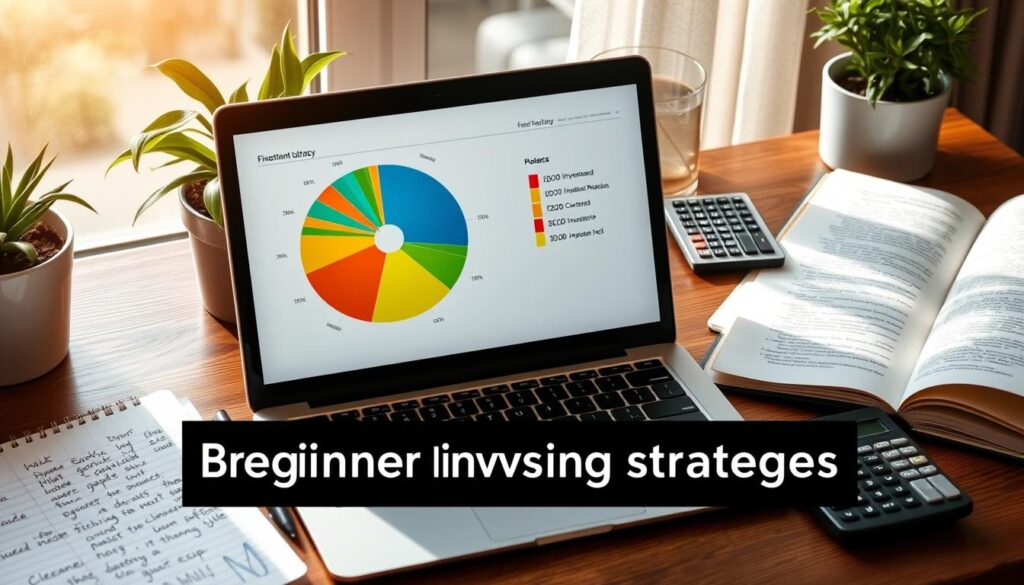Investing for Beginners: Start Your Journey
I’m super excited you’re here to start your investing journey! Investing for beginners can seem overwhelming, but I’m here to guide you through it step by step. Starting early is one of the best things for your financial future. Even small investments can grow into something amazing over time.
It’s easier than you think to start investing. With low minimums and fractional shares, anyone can jump into investing for beginners. You don’t need a huge chunk of money to get started! So, are you ready to take that first step towards financial freedom? Let’s dive in!
Investing for beginners is all about taking control of your finances and making your money work for you. When learning how to start investing, it’s essential to remember that it’s a journey, not a destination.
As you begin your investing journey, you’ll learn about different types of investments, such as stocks and bonds. You’ll discover how to create a diversified portfolio and make informed decisions about your investments. Investing for beginners is all about finding the right balance and making progress towards your financial goals. So, let’s get started and explore the world of investing for beginners and learn how to start investing today!
Key Takeaways
- Start investing early to take advantage of compound earnings
- You don’t need a lot of money to get started with investing for beginners
- Low minimums and fractional shares make it easy to begin investing
- Investing is a journey, not a destination, when learning how to start investing
- Diversification is key to a successful investment portfolio
- Investing for beginners is all about taking control of your finances and making progress towards your goals
Understanding the Basics of Investing
So, you’re ready to start your investing journey! That’s amazing! Investing can seem overwhelming at first, but trust me, it’s worth it. With the right beginner investing strategies, you can set yourself up for long-term success. A beginner investment guide can be a great resource to get you started.
Let’s break it down to the basics. Investing means using your money to buy assets that are expected to increase in value over time. It’s like planting a seed and watching it grow into a strong tree! One popular way to invest is through the stock market, where you can buy tiny pieces of companies you believe in.
What is Investing?
Investing is all about growing your wealth over time. It’s a way to make your money work for you, even while you’re sleeping! With a solid beginner investment guide, you can learn how to navigate the world of investing and make informed decisions.
Why Invest?
So, why should you bother investing? Well, investing is a great way to reach your financial goals, whether that’s saving for a down payment on a house or building a nest egg for retirement. By using beginner investing strategies, you can set yourself up for long-term success and achieve your goals.
Remember, investing is a journey, and it’s okay to start small. With the right mindset and a solid beginner investment guide, you can achieve your financial goals and live the life you want!
Types of Investment Options
As a beginner, knowing the different investment options is key. You want to make smart choices about where to invest, right? Let’s look at some popular options for beginners, including easy-to-start investments.
Stocks
Stocks let you own a piece of a company. This can help your wealth grow over time. But, it’s important to research and understand the risks.
Bonds
Bonds are loans to companies or governments. They offer a stable income but may have lower returns. Think about your goals and risk level when choosing between stocks and bonds.
Real Estate
Real estate investing means buying and managing properties. It can be profitable but needs a lot of money and knowledge. Yet, there are easier ways to start, like real estate investment trusts (REITs).
Mutual Funds
Mutual funds pool money to buy a variety of investments. They’re a good way to diversify and can offer higher returns. Many mutual funds are great for beginners, making them a solid choice.
Investing is a journey, and starting with beginner-friendly options is wise. By understanding your options, you can make smart choices and aim for long-term success.
Setting Financial Goals
Starting your investment journey means knowing your financial goals. Are you saving for a house or retirement? Clear goals guide your investments. Use tips like the 50/30/20 budget to manage your money.
Write down your financial goals, both short and long-term. Short-term goals might be saving for a trip or paying off debt. Long-term goals could be retirement or a house down payment. You can save for more than one goal at once.
Long-term goals include:
- Saving for retirement
- Buying a house
- Launching a business
By focusing on your goals and using simple investment tips, you’re on the path to financial success.
Risk and Return: Finding Your Balance
Understanding the link between risk and return is key for beginners. You need to find a balance that suits you. Investing carries risk, but the chance for gains makes it worth it. Beginner strategies aim to strike this balance.
Think of it like a seesaw: higher risk means higher returns but also more chance of losses. So, how do you find your balance? It’s about knowing your risk tolerance and making smart choices. Start by thinking about your financial goals and how soon you need to reach them.
For instance, if you’re young, you might take on more risk because you have time to recover. But if you’re near retirement, safer investments might be better to protect your savings.
Important things to remember about risk and return include:
- Diversification: spreading your investments to reduce risk
- Time horizon: thinking about how long you have to reach your goals
- Risk appetite: knowing your comfort with risk and making choices based on it
By considering these points and crafting a beginner investing strategy, you can balance risk and return. This balance will help you reach your financial goals.
Creating a Diversified Portfolio
As a new investor, knowing about diversification is key. It mixes different investments to get better returns and lower risks. By spreading your money across various types, you can lower risk without giving up on returns.
Start with best investments for novices like index funds and ETFs. They offer easy investment tips and help you diversify easily. You can also add stocks, bonds, and REITs to your mix.
Here are some easy investment tips to remember:
- Keep your portfolio to 20-30 investments for easy management.
- Use index funds or fixed-income funds to protect against market ups and downs.
- Regularly add to your investments using dollar-cost averaging to smooth out market changes.
Diversification is the secret to a great investment portfolio. Follow these easy investment tips and pick the best investments for novices. This way, you can build a diversified portfolio that fits your goals.
Investment Strategies for Beginners
Starting your investment journey is exciting but can feel overwhelming. It’s key to know the different strategies out there. A good beginner guide should cover dollar-cost averaging and value investing. These are great for new investors.
Dollar-cost averaging means investing a set amount regularly, no matter the market. It lowers the risk of timing the market. Value investing looks for stocks that are underpriced but have growth chances. These strategies can help you succeed in investing.
Some top strategies for beginners include:
- Dollar-cost averaging
- Value investing
- Index investing
- Income investing
These methods help you understand investing and make smart money choices. Remember, starting is just the beginning. With the right advice, you can reach your financial goals.

The Importance of Research
Investing is like trying a new restaurant. You want to know what you’re getting into before you commit. That’s why learning how to start investing and finding beginner-friendly investments is key. By doing your research, you can make informed decisions and avoid costly mistakes.
So, where do you start? You can begin by analyzing company financial statements, following financial news, and understanding market trends. It’s not as complicated as it sounds. There are many user-friendly tools and websites that can help you get started. For example, you can review quarterly and annual reports of companies to track their financial performance and growth prospects.
Some things to keep in mind when researching investments include:
- Looking at a stock’s historical performance to determine if it’s undervalued or overvalued
- Understanding tax implications and how they can impact your investments
- Considering seeking advice from investment advisors or mutual funds with professional analysts
Remember, investing is a journey, and it’s okay to start small and learn as you go. With the right research and resources, you can make informed decisions and achieve your financial goals. So, are you ready to put on your detective hat and start exploring the world of investment research?
Opening an Investment Account
So, you’re ready to start investing! That’s a great decision! Now, let’s talk about opening an investment account. It’s like taking the first step towards securing your financial future. When it comes to investing for beginners, it’s essential to understand the different types of investment accounts available. You can choose from individual brokerage accounts, retirement accounts like IRAs, or even 401(k) accounts.
When deciding how to start investing, consider what you want to achieve. Are you saving for retirement or a specific goal? This will help you choose the right type of account. For example, if you’re investing for retirement, a Traditional IRA or 401(k) might be a good option. On the other hand, if you’re looking for more flexibility, a brokerage account could be the way to go.
Here are some key factors to consider when choosing a broker:
- Fees: Look for low or no fees on transactions and account management.
- Investment options: Consider the types of investments offered, such as stocks, bonds, or mutual funds.
- User interface: Choose a broker with a user-friendly website or app.
Remember, investing is a journey, and it’s essential to start with a solid foundation. By understanding your options and choosing the right account, you’ll be well on your way to achieving your financial goals. So, take the first step and open an investment account today!
Managing Your Investments
Now that you’ve started investing, it’s key to manage your investments well. This means watching how your portfolio does and tweaking it when needed. As a beginner, remember that investing is a long-term game. It’s important not to get too caught up in short-term ups and downs.
One simple tip is to regularly check on your portfolio. You might do this every quarter or once a year, depending on your goals and how much risk you’re okay with. When you review your portfolio, you can see how it’s doing and make changes to keep it on track. This is called rebalancing, and it’s a big part of managing your investments.
Some important things to think about when managing your investments include:
- Regularly checking how your portfolio is doing
- Rebalancing your portfolio as needed
- Keeping up with market trends and economic changes
- Avoiding decisions based on short-term changes
By following these tips and using beginner strategies, you can manage your investments well. This will help you reach your financial goals.

Resources for Continued Learning
Starting your investing journey is just the beginning. It’s a lifelong process. The more you learn, the better you’ll be at making smart choices. There are many resources to help you grow your investing knowledge.
Books and Online Courses
Investing books like “A Random Walk Down Wall Street” and “The Simple Path to Wealth” are great starting points. Online courses from Coursera, Udemy, and Wharton Online let you learn at your own speed. This way, you can fit learning into your busy schedule.
Financial News Outlets
Keeping up with market news is key. Sites like The Economist, Barron’s, Investor’s Business Daily, and Seeking Alpha are reliable sources. Investor.gov and FINRA also offer great resources for new investors.
Learning to invest is a journey that never ends. Take advantage of every chance to learn and grow. With the right tools and effort, you’ll build a strong portfolio that meets your financial goals.






